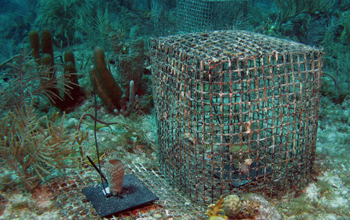Multimedia Gallery
Sponges smothering corals (Image 4)
A gray tube sponge is the subject of this growth experiment in progress on Conch Reef off Key Largo, Fla. With coral cover on Caribbean reefs at historic lows, sponges are now the dominant, habitat-forming animals on most of them.
The decline in coral is due to disease, heat stress from warming waters and waves from storms. Additionally, scientists have discovered that overfishing has added to this decline by lessoning the numbers of predator fish that feed on some sponge species.
Joseph R. Pawlik, a marine scientist at the University of North Carolina Wilmington, and colleagues used the underwater research lab Aquarius, moored on Conch Reef, to study the chemical ecology of Caribbean reef sponges.
Some reef sponges produce chemical defenses, called metabolites, which make them distasteful to fish. These metabolite-producing sponges are largely left alone by predator fish, such as angelfish and parrotfish; those that don't produce metabolites are subject to being grazed upon by fish. "That being said, when overfishing by humans removes these predatory fish, reefs shift toward faster growing sponges that can out-compete reef corals for space," says Pawlik. "That further hinders corals' chances of recovery."
These findings regarding the relationship between sponges and predator fish in coral reef communities are important because previous research led scientists to believe that Caribbean sponge communities were built up in areas where plankton--tiny floating plants and animals--was available. But research by Pawlik and colleagues on sponge growth using a cage to exclude predators found the opposite was true: "Overfished reefs that lack spongivores (sponge-eating fish) soon become dominated by faster growing, chemically undefended sponge species, which better compete for space with reef-building corals," says Pawlik. This finding will be used to help guide fisheries management in the future throughout the Caribbean.
To learn more about this research, which was supported by a grant from the National Science Foundation (OCE 10-29515), see the NSF Discovery story Life on a coral reef: Insult is (sometimes) added to injury. (Date of Image: 2011-2012) [Image 4 of 6 related images. See Image 5.]
Credit: Joseph R. Pawlik, University of North Carolina Wilmington
See other images like this on your iPhone or iPad download NSF Science Zone on the Apple App Store.
Images and other media in the National Science Foundation Multimedia Gallery are available for use in print and electronic material by NSF employees, members of the media, university staff, teachers and the general public. All media in the gallery are intended for personal, educational and nonprofit/non-commercial use only.
Images credited to the National Science Foundation, a federal agency, are in the public domain. The images were created by employees of the United States Government as part of their official duties or prepared by contractors as "works for hire" for NSF. You may freely use NSF-credited images and, at your discretion, credit NSF with a "Courtesy: National Science Foundation" notation.
Additional information about general usage can be found in Conditions.
Also Available:
Download the high-resolution JPG version of the image. (5.9 MB)
Use your mouse to right-click (Mac users may need to Ctrl-click) the link above and choose the option that will save the file or target to your computer.

